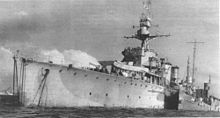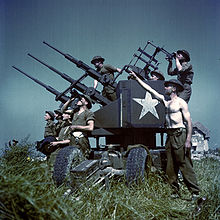Polish contribution to World War II
| Polish contribution to World War II | |
|---|---|

The personnel of submarine ORP Sokół displaying a Jolly Roger marking the number of sunk or damaged enemy ships
|
|

PZL.37 Łoś a Polish twin-engine medium bomber built at the PZL factory in Mielec
|
|

ORP Dragon, in the Polish Navy since January 1943
|
|

|
|

Anti-aircraft mounting, featuring three Polish Polsten cannons
|
The European theatre of World War II opened with the German invasion of Poland on Friday September 1, 1939 and the Soviet invasion of Poland on September 17, 1939. The Polish Army was defeated after more than a month of fighting. After Poland had been overrun, a government-in-exile (headquartered in Britain), armed forces, and an intelligence service were established outside of Poland. These organizations contributed to the Allied effort throughout the war. The Polish Army was recreated in the West, as well as in the East (after the German invasion of the Soviet Union).
Poles provided crucial help to the Allies throughout the war, fighting on land, sea and air. Notable was the service of the Polish Air Force, not only in the Allied victory in the Battle of Britain but also the subsequent air war. Polish ground troops were present in the North Africa Campaign (siege of Tobruk); the Italian campaign (including the capture of the monastery hill at the Battle of Monte Cassino); and in battles following the invasion of France (the battle of the Falaise pocket; an airborne brigade parachute drop during Operation Market Garden and one division in the Western Allied invasion of Germany). Polish forces in the east, fighting alongside the Red army and under Soviet command, took part in the Soviet offensives across Belarus and Ukraine into Poland, across the Vistula and towards the Oder and then into Berlin. Some Polish contributions were less visible, and some even overlooked, most notably the prewar and wartime deciphering of German Enigma machine codes by cryptologists Marian Rejewski and his colleagues. The Polish intelligence network also proved to be of much value to the Allied intelligence.
...
Wikipedia
